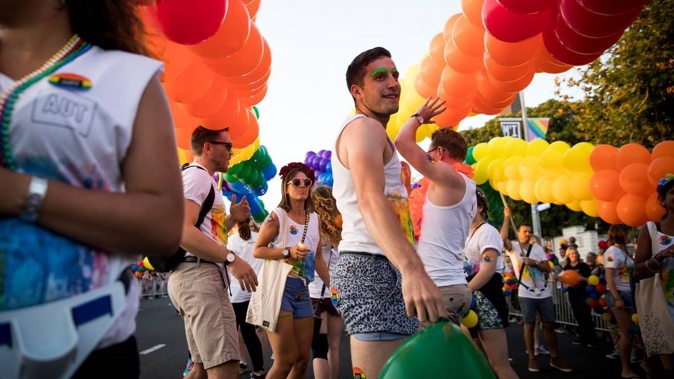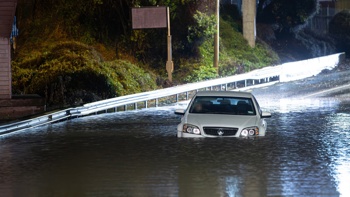
There are fears a global rise in anti-transgender and queer-phobic rhetoric is driving a new wave of hate towards New Zealand’s rainbow community.
In the last year, multiple community safe spaces have been damaged -- including a Greymouth church vandalised with homophobic and antisemitic slurs, and a Tauranga Rainbow Youth office burnt down in a suspicious fire.
Auckland Police recently had to intervene at a drag performer’s child-friendly story time session at the Avondale Library.
A video showed police confronting a small group of protesters who claimed they were asking the performer “not to groom children”.
QTopia Healthcare Lead, Jennifer Shields said they're seeing a rise in anti-LGBT rhetoric in online spaces, which is spilling out into real life.
“What we're seeing is that it's really coming from the same kind of misinformation circles that we saw a lot of the anti-Covid and anti-lockdown stuff from.”
She said it originated from similar spaces overseas, and is linked to a damaging ‘drag queen groomer rhetoric’ coming from the far-right in the United States.
The damaging false claim that drag performers doing the story times are “groomers” has been increasingly used in the US by opponents of drag, and the wider the LGBTQ+ community.
Anti-hate organisation ADL states that any claims the rainbow community are "pedophiles" who are "grooming" children in order to abuse them is a false and baseless narrative --weaponised by anti-LGBTQ+ figures.
Tennessee has become the first US state to ban drag shows in public – and a slew of other anti-drag bills have been introduced in at least fourteen other states.
Shields said there’s been a noticeable rise in anti-rainbow sentiment on our shores, with the transgender community targeted in particular.
For many in the community, there is a heightened awareness around their ensuring their safety.
Shields says it is clear there’s people “opposed to the idea of trans people at all”.
She believes it comes from an explicit narrative that trans people – and the wider queer community – are somehow unsafe for children.
Shields noted that while homophobia and transphobia has always existed, they’ve been keeping a close eye on what seems to be these growing beliefs being imported from overseas.
It’s something echoed by Gender Minorities Aotearoa national co-ordinator, Ahi Wi-Hongi.
They said while there’s always been consistent backlash towards the community, there’s clear ebbs and flows depending on what is happening politically.
Wi-Hongi believes as trans people’s human rights improve, and they are more seen in society – there’s a lot more pushback on the community.
“I think that's why it seems as though there's a lot more anti-trans sentiment over the last 10 years.”
In June, the new self-identification process officially begins.
It means those who identify as transgender, intersex, gender diverse, and takatāpui will no longer need proof of medical treatment or a Family Court declaration to change the sex listed on their birth certificate, but instead apply for it to be changed on the basis of how they identify.
Wi-Hongi imagines that may spark another wave of backlash from anti-transgender groups.
They said there has already been some – which they believe is an extension of the backlash that come from the Births, Deaths, and Marriages Act itself.
Shields is hopeful it will not spark a further rise in hate towards the community, but noted there have been dedicated groups in New Zealand, who have sought “since day one, to stop the Self Identification Bill from getting over the line”.
Wi-Hongi agrees there’s been false information from groups trying to misinform people about what the new regulations in June will mean.
Shields said the reality is that [self-identification] has “very little impact on those who aren’t transitioning or diverse themselves”.
“We never use our birth certificates for anything... no one checks them when you go into the bathroom or use a gym changing room.”
She said research is clear that for those who have official documents – like birth certificates – that reflects who they are, the boost to their well-being is significant.
The noticeable rise in global anti-transgender and queerphobic rhetoric has led to concerns for the impact it could have on those most vulnerable in the community.
The LGBTQ+ community is already known to have poorer mental health outcomes than the general population.
Late last year, Stats NZ found members of the rainbow community are more than two times more likely to experience daily feelings of anxiety and depression than people not in the LGBT+ population.
And a 2018 Counting Ourselves survey showed 76 percent of the trans and gender diverse community in Aotearoa experienced high or very high levels of psychological distress, compared to only eight percent of the general population.
Psychologist Jemima Bullock – who works with transgender and gender-diverse youth – says many experience ‘minority stress’.
Minority stress is often described as high levels of stress faced by members of stigmatized minority groups.
It may be caused by a number of factors, including poor social support and low socioeconomic status.
Bullock says for the young people she works with, transphobia is a daily issue.
She says many haven't socially transitioned -- and have only told their GP -- due to fears of discrimination and rejection by their peers and wider-society.
Bullock – who is based in Wellington – said even though the capital is deemed to be diverse and reasonably safe for the community, people still get the “odd slur or verbal abuse by total strangers on the street”.
She believes transphobia and non-acceptance of trans people is often worse in rural and smaller pockets of New Zealand.
Bullock says it leads to some people attempting to hide or suppress their own gender identity.
“As a result, it's a really stressful experience... and it certainly does contribute to poor mental health.”
Shields said for many, the current hateful online rhetoric and seeing it spill out into real life will definitely cause increased distress.
“I really wouldn't be surprised to see a really tangible impact on the wellbeing of our community from these kind of discussions... it is never a good feeling to see people openly debating your rights to be who you are and your right to live your life.”
Bullock agreed that it is distressing for many.
“It's upsetting to think that a group of people for some reason would want to deprive anybody to access healthcare or to live a true authentic happy life.”
LISTEN ABOVE
Take your Radio, Podcasts and Music with you









